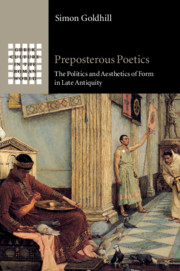Book contents
- Preposterous Poetics
- Greek Culture in the Roman World
- Preposterous Poetics
- Copyright page
- Contents
- Preface
- Acknowledgements
- Chapter 1 Forms of Attention
- Chapter 2 When Size Matters
- Chapter 3 In the Beginning
- Chapter 4 Preposterous Poetics and the Erotics of Death
- Chapter 5 Strange Dogs
- Chapter 6 Life Forms
- Coda
- References
- General Index
- Locorum Index
Chapter 1 - Forms of Attention
Time and Narrative in Ecphrasis
Published online by Cambridge University Press: 27 August 2020
- Preposterous Poetics
- Greek Culture in the Roman World
- Preposterous Poetics
- Copyright page
- Contents
- Preface
- Acknowledgements
- Chapter 1 Forms of Attention
- Chapter 2 When Size Matters
- Chapter 3 In the Beginning
- Chapter 4 Preposterous Poetics and the Erotics of Death
- Chapter 5 Strange Dogs
- Chapter 6 Life Forms
- Coda
- References
- General Index
- Locorum Index
Summary
Ecphrasis dramatizes a form of attention, the reflective gaze at an object. An ecphrasis also performs an interpretative process with which the reader is made complicit: the strategies of viewing comprehended by an ecphrasis are normative, even and especially when contested. When Marcel, Proust’s narrator in À la recherche du temps perdu, stands for almost three-quarters of an hour lost in admiration in front of paintings by Elstir, keeping his host and dinner guests waiting, we are invited by Proust’s prose not merely to imagine the entrancing paintings, but also to recognize and respect the aesthetic prowess and self-regard of the narrator – as well as to stand at some distance with the author from the narrator’s youthful fascination and social indiscretion. It is a passage that highlights aesthetic response as a function of modern social protocol, with Proust’s customary self-aware humour.1 How to stand in front of a picture, how long to look at it, what to look at, and, above all, in what language to articulate a response, are all expressive aspects of the cultural spectacle of ecphrastic performance, in antiquity as much as in fin-de-siècle Paris.2
- Type
- Chapter
- Information
- Preposterous PoeticsThe Politics and Aesthetics of Form in Late Antiquity, pp. 1 - 37Publisher: Cambridge University PressPrint publication year: 2020

